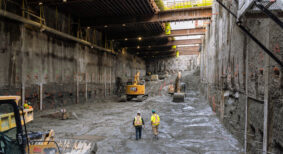Cash flow, particularly in the construction industry, is king. Without it, the entire process can come to a grinding halt with the inevitable finger-pointing, delay claims and, in some cases, litigation.
The sources of interrupted cash flow are multiple but their effect is similar.
Poorly financed projects can result in both unintended and intended delay in payment to builders, who, in turn, are unable to pay trades and material suppliers. The dire consequences of such a situation were recognized some time ago with the insertion in the CCDC (Canadian Construction Documents Committee) contract of the requirement that the owner demonstrate its financial strength at the outset of a project so there is some assurance of uninterrupted cash flow. Of course, such contractual provisions are only as good as the parties to the contract but there is some recognition of the importance to properly arrange and then honour financial obligations in the complex setting of a construction project.
Even a well-financed project can run into difficulty with an over-extended builder. The consequence of a builder being unable to pay its trades can have widespread ramifications for all project participants, including the project sponsors, builder’s trades and material suppliers, and consultants. In recognition of this difficulty, the industry adopted the use of performance bonds and labour and material payment bonds in an attempt to soften the blow of a builder who, for any one of a number of reasons, runs out of cash. Although bonds go some distance to alleviating the consequences of this situation, even the bond underwriters can be the reason for cash flow interruption if they adopt the position of a desperate builder who has provided indemnities to the underwriters in the event of the bond being called upon. But bonds do go some distance to assuring orderly completion of a project placed in peril by interrupted cash flow.
Another reason for interruption of cash flow on a project can be the use of contract payments on other projects or to discharge general overhead expenses of the payment recipient, unrelated to the project in question. In recognition of the impact this might have on all project participants, the Builders Lien Act places on notice the payment recipients and, if they are a corporation, their directors that the use of contract funds for unauthorized purposes such as general overheads and personal expenses is a breach of the trust provisions under the Act, with dire consequences for those who offend this prohibition. Yes, there are still offenders but these provisions should cause anyone to think twice about using payments for unauthorized cash flow rather than paying accounts owing to subtrades and material suppliers.
Of course, cash flow can also be interrupted due to incidents on a project, whether it be significant deficiencies in work of the builders or subtrades, delays in producing drawings and specifications, delays in the approval of shop drawings or delayed progress certificates. The contracts entered into between and among the parties attempt to deal with these situations in a fair and equitable manner, and many offer expedited dispute resolution techniques to solve these problems in a expeditious manner so as to not interrupt the progress of the work and, therefore, the cash flow required to move the project forward.
Against the background of these multiple causes of interrupted cash flow on projects and the various statutory and contractual dispute resolution mechanisms put in place to handle them, there remains one source of interrupted cash flow that begs for a similar solution. It is the “pay when paid” clauses, which is often seen in trade contracts or subcontracts entered into by trade and material suppliers with a builder or another trade. The gist of the clause is the builders or trades’ obligation to pay its trades or material suppliers will not be triggered until the builder or trade responsible for the payment is paid by the party with whom it contracts. For example, if an owner delays payment to a builder, then the builder’s trades are not entitled to payment of their certified progress claims until the builder is paid for those claims by the owner. Needless to say, such a contractual provision can have a debilitating effect on trades and material suppliers that rely on the day-to-day cash flow from their projects to remain financially viable.
Although there has been no contractual or statutory recognition of the inequity of such clauses up to this point of time, change is on the horizon.
Instigated by the need to remedy this unfairness of delay in payment for completed work, certain organizations within the Canadian construction industry have advocated for the adoption of prompt payment legislation comparable to that found in the U.K., Australia, New Zealand and the U.S. Ontario is currently leading the way with Bill 211.
Leading the lobbying movement in Ontario is a joint task force of the Ontario General Contractors Association (OGCA) and the Ontario caucus of the National Trade Contractors Coalition of Canada (NTCCC), which have met to discuss revisions to the bill.
Under the proposed legislation, no owner would be able to contract out of the payment requirements. Payment and valuation of payment terms in construction contracts are to be followed, with the exception that payments are to be made no less than monthly. If a contract does not provide for payment and valuation terms, the bill provides governance of those payments. Payment of an amount due under a contract is to be made within five days after a payment application is approved. A payment application is deemed to be approved 10 days after it is received by the owner, an agent of the owner or the engineer or architect of record. If a payment certifier fails to issue certification within the prescribed time period, the submission would automatically be deemed certified and due, unless the payer provides a timely written statement explaining any disapproval or amendment of such payment application.
Payment is still able to be deferred when contractors are awaiting payment but only the actual value of the amount disputed can be held back, and no holdbacks other than those provided for in the Construction Lien Act will be allowed. Furthermore, the legislation would mandate that the Canadian Derivatives Clearing Corp. clauses allowing access to owners’ financial information cannot be deleted from construction contracts.
Various members of the construction industry in B.C., including the Vancouver Regional Construction Association and Roofing Contractors Association of BC, eagerly await the completion of the Ontario legislation from which they hope a comparable piece of legislation will be developed in B.C. It is change that is far overdue.
John Singleton, Q.C., is a partner at Singleton Urquhart LLP in Vancouver. Talya Nemetz-Sinchein is an articling student at the firm.









